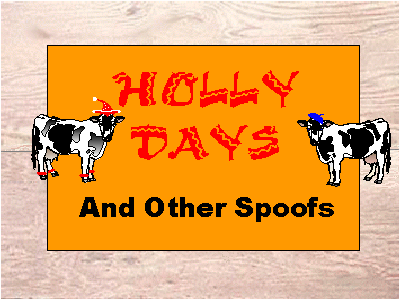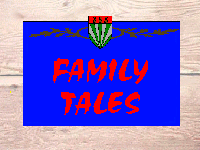
|
~ NEW YEAR'S EVE 1999 ~ |
|
(Millennium is so overused these days. Chiliad is the Greek word for the same thousand year period, and it avoids those awful Roman associations with vomitoriums…..)
Of all holidays, the celebration of the New Year is the oldest, the most universal, and all too often, the least remembered. There are records of a New Year's celebration in ancient Babylon over 4,000 years ago, although for them (and many other early civilizations) the beginning of the new year was in late March. There was good reason to hold this celebration in the Spring…. for example, Laurence Welk is far more tolerable when it's warm enough to open the windows during songfests, and if you happened to pass out after a particularly jovial chorus of Auld Lang Syne, you were far less likely to wake up with your head in a yellow snow bank, and your bare ass frozen to the asphalt. January 1st, on the other hand, is an arbitrary date chosen by Roman bureaucrats and others seeking to avoid the St. Patrick's Day parade. It's cold, dark, and comes dreadfully close on the heels (high heels, of course) of the Christmas Eggnog Bacchanalia. Nope, I think the ancient Babylonians had the right idea, celebrate when it's warm enough that you can feel the mead make your limbs go numb. By the way, the Babylonians were among the earliest brewers of beer. They had at least 20 different kinds. And knowing that no work would be done otherwise, they rationed their beer: 2 liters per day for workers, 3 liters for civil servants and 5 liters per day for administrators, high priests, and speech writers -- truly they were a civilized people! They also came up with the great concept of celebrating the New Year for eleven days. But being a particularly discriminating and refined lot, the Babylonians were not satisfied with the same party every day, so each day had its own particular mode of celebration: The Day of Frozen Drinks, the Day of Stupid Party Hats, the Day of French Pastries, and so on….. The Chinese, another traditional partying people, also celebrated the New Year as the Spring Festival, and, not to be outdone by those barbarians to the west, they stretched out their celebrations for 15 days! Needless to say, there are certain activities that traditionally go into preparing for a celebration of this length. For example, a huge clean-up gets underway days before the first New Year's bash. Houses are cleaned from top to bottom, to sweep away any traces of bad luck, bad karma, and bad sushi left over from last year's party. In addition, doors and window panes are given a new coat of paint, and decorated with paper cutouts with themes such as happiness, wealth, longevity, and "party like it's 1999" printed on them. The ancient Persians gave New Year's gifts of eggs, which they typically threw at the heads of passing Babylonians. This resulted in the modern tradition of "Eggnog" and has been corrupted over the years to include certain "trick or treat" activities during modern Halloween festivities (none of which I have EVER been caught participating in, as my chief legal counsel reminds me...). Celtic priests gave people branches of mistletoe, considered a sacred plant, on New Year's Eve. This gradually evolved into the English tradition of consuming large quantities of juniper, now loosely considered to be Gin, over the holidays. So where is the first place to start the New Chiliad? Well, according to the U.S. Naval Observatory, the first populated land where the sun will rise on new year's day is Kahuitara Point (also known as Gesundheit Point or Sneezy Point) on Pitt Island in the Chatham Islands, a dependency of New Zealand (which is now a wholly owned subsidiary of Standard Oil). And speaking of the new chiliad, I have good news and bad news. Because the calendar system that was in use during a particular thousand year period determines the actual number of days that elapse during that time span, our current chiliad (1001 - 2000 AD) is shorter than the previous chiliad by 13 days (what a ripoff! I want my money back….) 365,237 days vs. 365,250 days for the year 1 - 1000 AD period. That's the bad news. The good news is that the next chiliad (2001 - 3000 AD) will consist of 365,242 days, so we'll get an extra 5 days to party like it's 2999! Let's start planning now. You know how hard it can be to get a hotel room on New Chiliad Eve…..
|
|
Other Places in the Barn Watch where you step...." | ||
 |
 |
 |
 |

|

|
 |
 |
 |
You are one of people to have stopped by.
Please let me know how you enjoyed your stay.
Scott Michaud is
MAZHUDE@HOTMAIL.COM
Professional writer, editor,
fact-finder, and occasional user
of Standard American English.
Here's my old
GUESTBOOK,
which may or may not still work.
|
Sign My NEW Guestbook Just Look At My NEW Guestbook |